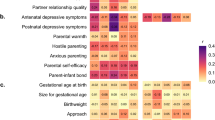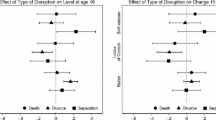Abstract
Using data gathered during nearly four years of field work among the Fulbe of Upper Volta and their ex-slaves the Riimaaybe, the author argues that the major differences between the dominant personality types of these two groups cannot be due to child rearing practices because those practices are identical. He then accounts for the differences by taking personality to be portrayal of one's sense of self and the latter to derive chiefly from perception of one's location in the social structure. The implications of this analysis are drawn upon to elucidate the reasons why it is so widely believed that parental practices are of crucial importance to character formation.
Similar content being viewed by others
References
Bettelheim, Bruno 1955 Truants From Life: The Rehabilitation of Emotionally Disturbed Children. Glencoe, Ill.: Free Press.
Brazelton, T. Berry 1969 Infants and Mothers. New York: Delacorte Press.
Delmond, Paul 1952 Essai de classification des Peul du Cercle de Dori. In Conferencia International Dos Africanistas Ocidentais, Bissau, 1947, vol. 5, pt. 2, pp. 27–52. Lisbon.
Dognin, Rene 1975 Sur trois ressorts du comportement peul. In Theodore Monod (ed.), Pastoralism in Tropical Africa, pp. 298–321. London: Oxford University Press (for IAI).
Dupire, Marguerite 1962 Peuls nomades. Paris: Institut d'Ethnologie.
Erikson, Erik 1953 Growth and Crises of the ‘Healthy Personality’. In Clyde Kluckhohn, Henry A. Murray, with David M. Schneider (eds.), Personality in Nature, Society, and Culture, 2nd ed., pp. 185–225. New York: Knopf.
Erikson, Erik 1963 Childhood and Society. 2nd ed. New York: W. W. Norton.
Freud, Sigmund 1924 A General Introduction to Psychoanalysis. Joan Riviere, translator. New York: Boni and Liveright.
Gecas, Viktor 1982 The Self-Concept. Annual Review of Sociology 8: 1–33.
Goffman, Erving 1961 Encounters: Two Studies in the Sociology of Interaction. Indianapolis: Bobbs-Merrill.
Goffman, Erving 1967 Interaction Ritual: Essays on Face-to-Face Behavior. New York: Doubleday Anchor Books.
Guntrip, Harry 1973 Psychoanalytic Theory, Therapy, and the Self: A Basic Guide to the Human Personality in Freud, Erikson, Klein, Sullivan, Fairbairn, Hartmann, Jacobson, and Winnicott. New York: Basic Books.
Hopen, C. Edward 1958 The Pastoral Fulbe Family in Gwandu. London: Oxford University Press (for IAI).
Kagan, Jerome 1980 Perspectives on Continuity. In Orville G. Brim, Jr. and Jerome Kagan (eds.), Constancy and Change in Human Development, pp. 26–74. Cambridge: Harvard University Press.
Kagan, Jerome, and Howard A. Moss 1962 Birth to Maturity. New York: Wiley.
Kane, Cheikh Hamidou 1961 L'aventure ambiguë. Paris: Julliard.
Kaplan, Bert 1961 Personality Study and Culture. In Bert Kaplan (ed.), Studying Personality Cross-Culturally, pp. 301–311. Evanston, Ill.: Row, Peterson.
Kracke, Waud 1978 Force and Persuasion: Leadership in an Amazonian Society. Chicago: The University of Chicago Press.
Langer, Susanne 1942 Philosophy in a New Key. Cambridge: Harvard University Press.
Langer, Susanne 1953 Feeling and Form. New York: Charles Scribner's Sons.
LeVine, Robert A. 1973 Culture, Behavior, and Personality. Chicago: Aldine.
Loewald, Hans W. 1962 Internalization, Separation, Mourning, and the Superego. The Psychoanalytic Quarterly 31: 483–504.
Loewald, Hans W. 1973 On Internalization. The International Journal of Psychoanalysis 54: 9–17.
Mead, George Herbert 1964 George Herbert Mead On Social Psychology. Selected papers, edited and with an Introduction by Anselm Strauss. Chicago: The University of Chicago Press.
Moss, Howard A. and Elizabeth J. Susman 1980 Longitudinal Study of Personality Development. In Orville G. Brim, Jr. and Jerome Kagan (eds.), Constancy and Change in Human Development, pp. 530–595. Cambridge: Harvard University Press.
Olivier de Sardan, Jean-Pierre 1973 Personnalité et structures sociales (A propos des Songhays). In Colloques Internationaux du CNRS No. 544: La notion de personne en Afrique noire, pp. 421–445. Paris: Editions du CNRS.
Parke, Ross D. and Steven R. Asher 1983 Social and Personality Development. Annual Review of Psychology 34: 465–509.
Piaget, Jean 1951 Play, Dreams and Imitation in Childhood. C. Gattegno and F. M. Hodgson, translators. New York: W. W. Norton.
Riesman, Paul 1975 The Art of Life in a West African Community: Formality and Spontaneity in Fulani Interpersonal Relationships. Journal of African Studies (Los Angeles) 2: 39–63.
Riesman, Paul 1977 Freedom in Fulani Social Life: An Introspective Ethnography. Chicago: The University of Chicago Press.
Rohner, Ronald P. 1975 They Love Me, They Love Me Not. A Worldwide Study of the Effects of Parental Acceptance and Rejection. New Haven: HRAF Press.
Seydou, Christiane 1972 Silamaka et Poullori, épopée peule du Massina. Paris: Editions A. Colin.
Shweder, Richard A. 1979 Rethinking Culture and Personality Theory Part I: A Critical Examination of Two Classical Postulates. Ethos 7: 255–278.
Spock, Benjamin 1968 Baby and Child Care (Revised Edition; 1st Edition, 1945). New York: Pocket Books.
Stenning, Derrick J. 1959 Savannah Nomads. London: Oxford University Press (for IAI).
Wallace, Anthony F. C. 1952 The Modal Personality Structure of the Tuscarora Indians, as Revealed by the Rorshach Test. Washington: Bulletin 150, Bureau of American Ethnology.
Wallace, Anthony F. C. 1970 Culture and Personality (Second Edition). New York: Random House.
White, Burton L. 1975 The First Three Years of Life. Englewood Cliffs, N.J.: Prentice-Hall.
Whiting, J. W. M. and Irvin L. Child 1953 Child Training and Personality: A Cross-Cultural Study. New Haven: Yale University Press.
Author information
Authors and Affiliations
Rights and permissions
About this article
Cite this article
Riesman, P. On the irrelevance of child rearing practices for the formation of personality. Cult Med Psych 7, 103–129 (1983). https://doi.org/10.1007/BF00051845
Issue Date:
DOI: https://doi.org/10.1007/BF00051845




